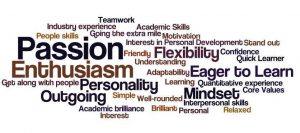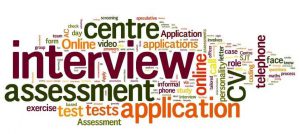January 22, 2019, by Katy Johnson
How a Rapid Change in Technology Increases New Opportunities for Graduates
By Chris Jones, Senior Careers Advisor for Faculties of Science and Engineering
Monday, 29 October 2019 saw over 40 varied companies descend on the East Midlands Conference Centre to meet our brilliant students and to promote their opportunities within science and technology. Members of the Careers team were also there on the day speaking to employers to find out more about what they look for in their graduates. As well as what their application process involves, what will be the key issues and technologies impacting on their sector over the next five years. Here are a few headlines:
1. Passion, enthusiasm and personality are key
Employers value the skills and knowledge you will gain through your degree. In some cases may require specific qualifications or grades. However, while these may get you through the door they won’t get you the job.
When we asked employers about the most important thing they look for in their recruitment, the most common responses are personal qualities and attitude. Passion and enthusiasm came out very strongly, along with other qualities such as eagerness to learn, flexibility and a positive mindset. Personality also rated very highly, with many employers keen to find people who would be the right ‘fit’ for their organisational culture. Employers will often tell us that they can teach graduates skills, knowledge and how to do the job. They will recruit for personality and attitude which can’t be taught.
So… have a think about how you can put across your personal attributes, motivation and enthusiasm in your applications and interviews. Remember that who you are can sometimes be more important than what you know and what you can do.
2. Be prepared for a variety of recruitment methods and processes
Companies and organisations will all have different approaches to the recruitment and selection process. They will use the method best suited to their company needs and what they think will help them secure the best candidate. For some, this can be a relatively quick and straightforward process, whereas for others it can involve a range of different stages.
- First impressions count: Online applications, CVs and covering letters – most companies have some form of written application as their first stage. So attention to fine detail, spelling and grammar is vital. It is important to show you have the right motivation, skills and experience for the role to give a great first impression.
- Tests and assessments – many companies use some form of testing or assessment to select candidates with the potential for the role. Commonly this will take the form of online psychometric tests including aptitude or situational judgement tests (if that sentence meant nothing to you, head over to our webpage on psychometric tests for more info and free practice tests!) Other companies test more directly the skills required in the job for example, McCann Medical require candidates to do a short medical writing test. The Government Statistical Service has a maths test, while UniDays and Next Jump set a basic coding challenge
3. Initial contact with the employer
- Companies who have some form of initial ‘screening’ interview use either telephone interviews or video interviews. This is their first chance to see how you come across verbally; so again consider how you can make a good impression while being aware of the key differences. A telephone interview will be a conversation with someone, whereas, a video interview you will usually be recording your answers. Head to our page on interviews for further advice and the chance to practise.
- Interviews and assessment centres; 60% of the companies we spoke to use assessment centres as part of their recruitment process, so take some time out to plan and prepare for these. Try attending one of our mock assessment centres. Finally, you are unlikely to get any job without having some form of face-to-face interview somewhere along the line. This is where you really show that you’re the best person and right fit for the role. Think back to those attributes we mentioned earlier; personality, enthusiasm and personality – how can you put these across in your interview?
Check out the making applications section of our website for further advice and resources to help you prepare for whatever selection processes you might face.
4. The fourth industrial revolution is coming!
You may have read our blog on the 4th Industrial Revolution or have heard talk of ‘Industry 4.0’ – the culmination of rapid advances in technology that are set to change the way we live and work. A big part of this change is the continuing development of Artificial Intelligence and Machine Learning. This was certainly reflected in the responses from our employers (bearing in mind most of these work in the technology sector). There was a significant number citing these factors as major issues affecting their sectors over the next five years. Other technology-related developments included cybersecurity, the internet of things, blockchain, quantum computing, data, and electric/autonomous vehicles. Have a look at our Emerging Careers in Science and Technology pages and related articles for more insights. Check out our forthcoming Spotlight On: Robotics and Artificial Intelligence which will be happening in February 2019.
My key takeaways from all of this? We’re living in a world of rapidly changing technology leading to new and exciting opportunities. Although some employers are starting to change the way they go about graduate recruitment, most still use the same processes that have been around for some time. We can help you to navigate. Don’t forget, it’s not just your qualifications, technical skills, and experience that they’re interested in, it’s who you are as a person. For future support from your career advisers on some of these topics discussed within this blog, book an appointment.
No comments yet, fill out a comment to be the first




Leave a Reply